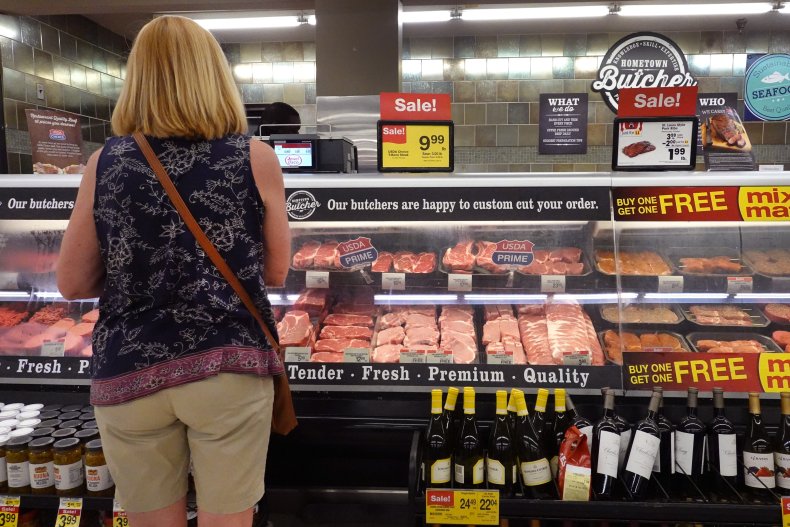This Is How Much More Americans Are Paying for Groceries Amid Inflation Concerns
Inflation is hitting Americans' wallets, giving them less purchasing power than they had a year ago at the grocery store, with average beef prices going up by about $1.35 per pound.
Food prices have been on the rise since the spring and the Consumer Price Index for meats, poultry, fish and eggs increased 11.9 percent last month from October 2020. The Consumer Price Index (CPI) measures the change in average prices consumers pay for a basket of goods, so the rising CPI means that $20 at the grocery store in October of this year didn't go as far as it did last year.
Beef saw the most significant price increase, at 20.1 percent, the Bureau of Labor Statistics reported on Wednesday. On average, Americans were paying $1.35 more per pound for beef than they were last year, according to data from the United States Department of Agriculture.
Increases varied based on the type and cut of meat and USDA choice boneless sirloin steak saw the largest per pound increase and now is $2.73 more per pound than it was last year, according to the USDA data.
The increase in pricing of steaks overall is significantly higher than other types of beef, so consumers may opt to purchase a beef roast or ground beef instead. Ground beef saw the lowest average per pound increase, at $0.69.
President Joe Biden acknowledged inflation rose over the last month and said price increases hurt "Americans' pocketbooks." A president who campaigned on being an advocate for the middle class, he called reversing the trend a "top priority" for his administration but didn't explicitly address rising food costs, instead focusing on increased cost for energy.
"We have more work to do, but there is no question that the economy continues to recover and is in much better shape today than it was a year ago," Biden said.
Along with beef, Americans have seen average price increases on pork, chicken, eggs and milk, according to Wednesday's report. Pork, on average, was up about $0.55 per pound, including a $1.60 increase on a pound of bacon. Chicken was up by only about $0.13 per pound, a number that was being tempered by the decrease in the cost of a fresh, whole chicken.
The cost for a dozen eggs has risen by about $0.41 and a gallon of fresh, whole milk is up by about $0.28.

Rising inflation has plagued Biden's administration and Republicans continue to up the pressure on the president as Biden's poll numbers steadily fall. Wednesday's report marked the fastest annual rise in the Consumer Price Index since 1990 and Stephen Moore, former President Donald Trump's economic adviser, warned Biden's policies are "making life worse, not better, for working-class Americans."
Representative Jim Jordan, an Ohio Republican, noted that inflation is occurring right "in time for the holidays" and Senator Ted Cruz posted on Twitter that Americans are "paying the price" for Biden's crises.
Democrats fought back against criticism of Wednesday's inflation report with pushes to pass Biden's Build Back Better plan. A social spending package, White House press secretary Jen Psaki said the "good news" for members of Congress is that they can vote in favor of the package that will "bring down costs and combat inflation."
Senate Majority Leader Chuck Schumer also advocated for the passage of the Build Back Better plan, calling it the "best way" to address inflation because it creates jobs and reduces bottlenecks.
The package, however, is at a standstill until Democrats can create a unified caucus. Unlike the recently-passed infrastructure bill, Republicans aren't backing the Build Back Better act and if Democrats want to bypass their Republican counterparts to pass the bill, they need every member on board.
Senator Joe Manchin, a moderate Democrat from West Virginia and one of the few holdouts on the package, criticized the rising inflation on Wednesday.
"By all accounts, the threat posed by record inflation to the American people is not 'transitory' and is instead getting worse. From the grocery store to the gas pump, Americans know the inflation tax is real and D.C. can no longer ignore the economic pain Americans feel every day," Manchin tweeted.
Americans have about $1.24 less buying power than they did a year ago, according to the Bureau of Labor Statistics. Twenty dollars in October 2020 now has the buying power as $21.24, a five-fold increase from October 2019 to 2020, when buying power was at $20.24.

